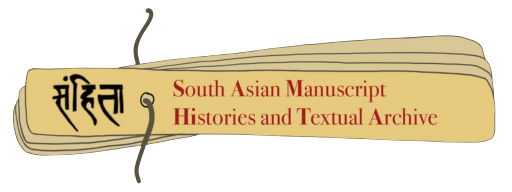Manuscripts
Search Filter
Sanskritatattvabodhinī
EAP1023/25/19 Language : Sanskrit Scripts : Devanagari
Story of a brāhmin Devadattaśarman from Viśālā (in modern Bihar) who is entrusted with the education of a prince, and whose son Gopibhaṭṭaśarman impresses the court with his erudition. The author Vāmadevaśarman says his purpose in telling the story is to make Sanskrit easily accessible to young people. The scribe was Revatīramaṇa Paṇḍita.
Mudrārākṣasa
EAP1023/25/20 Language : Sanskrit Scripts : Newari
An incomplete manuscript of the Sanskrit play by Viśākhadatta on the ascent to power of King Candragupta Maurya, dated to the sixth century CE. The seventh (last) aṅka is incomplete.
Rāghava Pānḍaviya Mahākāvya
EAP1023/25/21 Language : Sanskrit Scripts : Devanagari
This contains all 13 sarga-s of the mahākāvya by Kavirājapaṇḍita, which uses śleṣa to narrate the Rāmāyaṇa and Mahābhārata simultaneously. Kavirājapaṇḍita (or Kavirāja Sūri) was court poet of ‘Vīra’ Kāmadeva II (1182–87) of the Kādambas of Jayantīpura (Karnataka region). The first three folios have marginal notes explaining the double meanings. A pencilled note on the cover refers to the tīkā (commentary) by Śaśidhara, which seems to have formed the second part of the manuscript, going by the folio numbers. The last folio shifts from Newari to Devanagari to elaborate on the simultaneous references to Sitā/Draupadi.
Mahākala Saṁhitā
EAP1023/25/22 Language : Sanskrit Scripts : Newari
Mahakala Samhita is a Tantric text related to Goddess Mahakali. It is believed to have been composed in the 10th century and is ascribed to Adinath. Mahakali is the chief goddes of the whole tantric system based on the Vamacara practices and manifests in 51 different female forms.
Śiśupālavadha
EAP1023/25/24 Language : Sanskrit Scripts : Devanagari
The first ten cantos of Shishupala Vadha, one of the six Sanskrit mahakavyas (epic poems). Composed by Māgha in the 7th or 8th century, it has 20 cantos of about 1800 highly ornate stanzas. The manuscript includes marginal notes written in ornamental style reflective of Magha's own.
Kālikā Sahasranāma Stotra
EAP1023/25/25 Language : Sanskrit Scripts : Devanagari
This is the stotra or the prayer to Shree Kalika Devi (Goddess Kali) who is the remover of darkness. As the name indicates, it is a thousand-name hymn.
Jayākhya Saṁhitā
EAP1023/25/27 Language : Sanskrit Scripts : Newari
Jayakhya Samhita is one of the three gems of most important Samhitas. The other two are Satvata Samhita and Pushkara Samhita. They are Pancharatra texts. This work is one of the cardinal texts of Pancaratra literature. It deals with creation, practice of Yoga and mantropasana, ritual worship and fire ritual, initiation, codes of conduct for Vaishnavas; and expiations of sins.
Jayākhya Saṁhitā
EAP1023/25/28 Language : Sanskrit Scripts : Newari
Jayakhya Samhita is one of the three gems of most important Samhitas. The other two are Satvata Samhita and Pushkara Samhita. They are Pancharatra texts. This work is one of the cardinal texts of Pancaratra literature. It deals with creation, practice of Yoga and mantropasana, ritual worship and fire ritual, initiation, codes of conduct for Vaisnavas; and expiations of sins.
Śīghrabodha
EAP1023/25/29 Language : Sanskrit Scripts : Newari
This is an astrological text, it consists four prakaraṇas: vivāhaprakaraṇa, muhūrtaprakaraṇa, arghaprakaraṇa and ketūdayādiphalaprakaraṇa or saṃvatsaraprakaraṇa.
Saundaryalaharīstotra
EAP1023/25/31 Language : Sanskrit Scripts : Devanagari
The Saundarya Lahari meaning 'The waves of Beauty' is a famous literary work
Rudra Paddhati
EAP1023/25/32 Language : Sanskrit Scripts : Devanagari
Rudrapaddhati or Rudrānuṣṭhānapaddhati is the name of a work ascribed to Nārāyaṇa-bhaṭṭa (born 1513 C.E.): an author of Sanskrit prosody as well as a celebrated authority on Dharmaśāstra, who resided in Benares [Vārānasi] in 16th Century.
Sarasvatī Stotra
EAP1023/25/33 Language : Sanskrit Scripts : Devanagari
This is the stotra of Goddess Sarasvati, the goddess of wisdom in Hinduism. This Stotra is recited to appease the goddess. This Stotra is spoken by Brahma and contained in the Brahmanda Purana [Brahmāṇḍapurāṇa].













